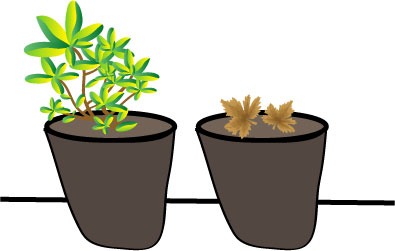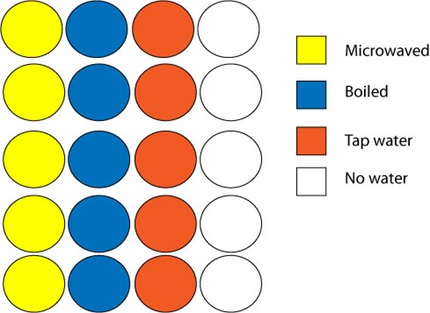What is Science?
Science flourishes best when it uses freely all the tools at hand, unconstrained by preconceived notions of what science ought to be.
~ Freeman Dyson, in The Scientist as Rebel
Science involves gaining understanding about our natural world. Scientists investigate questions about events in the natural world while trying to be as objective as possible.
What people sometimes forget is that the conclusions to these investigations are tentative and will change as new techniques, equipment and ideas are generated. Science is constantly on the move.
Scientific Method
Scientists use both inductive reasoning (a general statement develped from multiple observations or a body of facts) and deductive reasoning (a general statement infers a specific conclusion) to investigate questions. Although the process itself varies considerably depending on the question, there are some recognized steps.
First a scientist often makes some sort of an observation, perhaps while out on a walk on the beach or in the lab while doing other experiments. That observation may generate a question in the scientist’s mind, which he or she might eventually use to formulate into a hypothesis (guess or tentative explanation for the observation). At that point the scientist will research the literature to see if any other scientists have already investigated this hypothesis. This is particularly important, because science builds on past knowledge.
If the hypothesis seems worth further investigation, the scientist will design and carry out an experiment, or series of experiments, to test it. The scientist will collect data in the form of measurements and analyze the data, often using statistics. If the results of the experiment(s) confirm the hypothesis, the scientist may publish his or her work to communicate it to others.
If the experiment does not work out, the scientist may revise the hypothesis or throw it out altogether.
Throughout the experiments the scientist may make further observations, which lead to more hypotheses. The scientific method is not a linear, step-by-step process like following a recipe, but may be a complex and convoluted one.
Over time, as more and more scientists throughout the world test and confirm a given hypothesis or set of hypotheses, those may become a law. If the hypotheses and/or laws become well established and are deemed to have a sufficient power to explain phenomena, then they are “promoted” and considered to be theories.
Example:

Alisha is making herself some tea and microwaves a cup of water. Changing her mind, she notices her houseplant looks wilty and decides to water it with the water in her cup. She dumps in the microwaved water and goes away.
The next day Alisha notices her plant is dead (observation).
She wonders what killed it (question).
She decides that it might have been the microwaved water (hypothesis).
At this point she researches the question by going on the Internet and finds conflicting information. Some sources say microwaved water kills plants and others sites say that it is a hoax. Although the sites that say it is a hoax seem more reputable, Alisha decides to test it herself by performing an experiment.
Designing an experiment requires careful thought. Alisha realizes she must gather plants of the same kind and age to test. If she uses different kinds or ages of plants, that creates unwanted variables. She also realizes she must gather a number of plants. If she only uses one per treatment, something else might change the results. For example, her cat might eat one of the plants.
She buys 20 marigold plants that appear to be similar from the nursery. They are in separate pots. Alisha puts the plants in 4 rows and 5 columns on a table under a grow light. She decides on four treatments: microwaved tap water, boiled tap water, regular tap water, and no water. She decides to measure the height of the plants every other day, which will generate data. If her hypothesis is correct, the plants that receive microwaved water will die.
Alisha decides to apply the water treatments by hand. Here is her plan:

Is Alisha's plan a good one? Would you make any changes?
Once you've thought about it, check our assessment.


